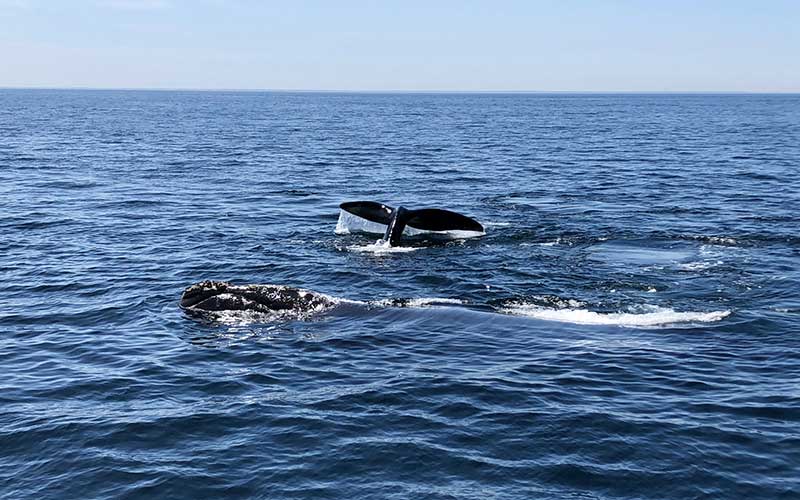
WASHINGTON— Conservation groups filed a rulemaking petition today seeking additional ship-speed limits along the Atlantic coast to protect critically endangered North Atlantic right whales. In June a baby right whale was found dead off the coast of New Jersey, with propeller wounds across its head, chest, and tail.
The petition asks the National Marine Fisheries Service to expand the areas and times when its existing 10-knot rule applies and to make all vessel-speed restrictions mandatory, rather than voluntary, to avoid collisions that kill and injure right whales.
“What we are asking for are essentially school zones along our coast, areas where vessels have to slow down to keep boaters and whales safe without stopping traffic,” said Regina Asmutis-Silvia, executive director of Whale and Dolphin Conservation’s North American office. “Ships slowing down saves whales, smaller vessels slowing down saves lives, everyone slowing down saves a species.”
The Center for Biological Diversity, Conservation Law Foundation, Defenders of Wildlife, the Humane Society of the United States, Humane Society Legislative Fund and Whale and Dolphin Conservation filed the petition, which asks for expedited consideration because of the urgent need to protect this declining population.
“Slowing ships will speed up right whale recovery by avoiding deadly collisions where these whales gather. We need to protect them while they feed and raise their families,” said Kristen Monsell, oceans legal director at the Center for Biological Diversity. “Speed limits are a simple and effective way to prevent unnecessary deaths of these amazing whales.”
North Atlantic right whales are among the world’s most imperiled marine mammals, with only about 400 animals alive today. Thirty-one right whales have been found dead since 2017, and the Fisheries Service believes at least another 10 have died, or will die, from existing injuries.
The calf recently found off New Jersey bore signs that it had been run over by two different vessels. Another right whale calf was struck and seriously injured by a vessel earlier this year off the coast of Georgia and has not been seen again. Devastatingly, these were two out of only 10 baby whales born in the most recent calving season.
“Right whale recovery has been plagued by two major threats: entanglements and vessel strikes,” said Erica Fuller, Senior Attorney at Conservation Law Foundation. “In the Northeast, we’ve been addressing entanglement risks for several years, and we must address the risk of ship strikes. Preventing entanglements but not vessel strikes is like paying your mortgage but not your taxes. You need to do both if you want to keep your house.”
Just over half of the known or suspected causes of right whale deaths since 2017 have been attributed to vessel strikes, closely followed by entanglements in fishing gear.
The existing speed rule applies to ships 65 feet and longer and sets seasonal speed limits off Massachusetts, the mid-Atlantic, and the whale’s calving grounds in Georgia and Florida. It also establishes a voluntary dynamic management system whereby ships are asked, but not required, to slow to 10 knots or less when a group of three or more right whales is seen in an area.
“Since 2017 there have been three confirmed North Atlantic right whale deaths or serious injuries caused by vessel strikes,” said Jane Davenport, a senior attorney at Defenders of Wildlife. “Compounding this tragedy, all three were baby or juvenile right whales. We can’t save this species if we don’t protect its future.”
The groups are asking the agency to expand existing speed limits near New York, New Jersey, Rhode Island, and Virginia further offshore and expand when the rule applies off Massachusetts. They’re also asking the agency to make the voluntary dynamic measures mandatory following several reports indicating that ships are not complying with voluntary measures.
“Rare as they are, we’ve been able to count on right whales being in our coastal waters seasonally each and every year. We need the National Marine Fisheries Service to act swiftly to protect them before they disappear,” said Sharon Young, senior strategist for marine issues for the Humane Society of the United States.
An agency review of the existing rule found that the agency should not only extend the rule but also amend it to implement necessary protections for this highly endangered species.
###
